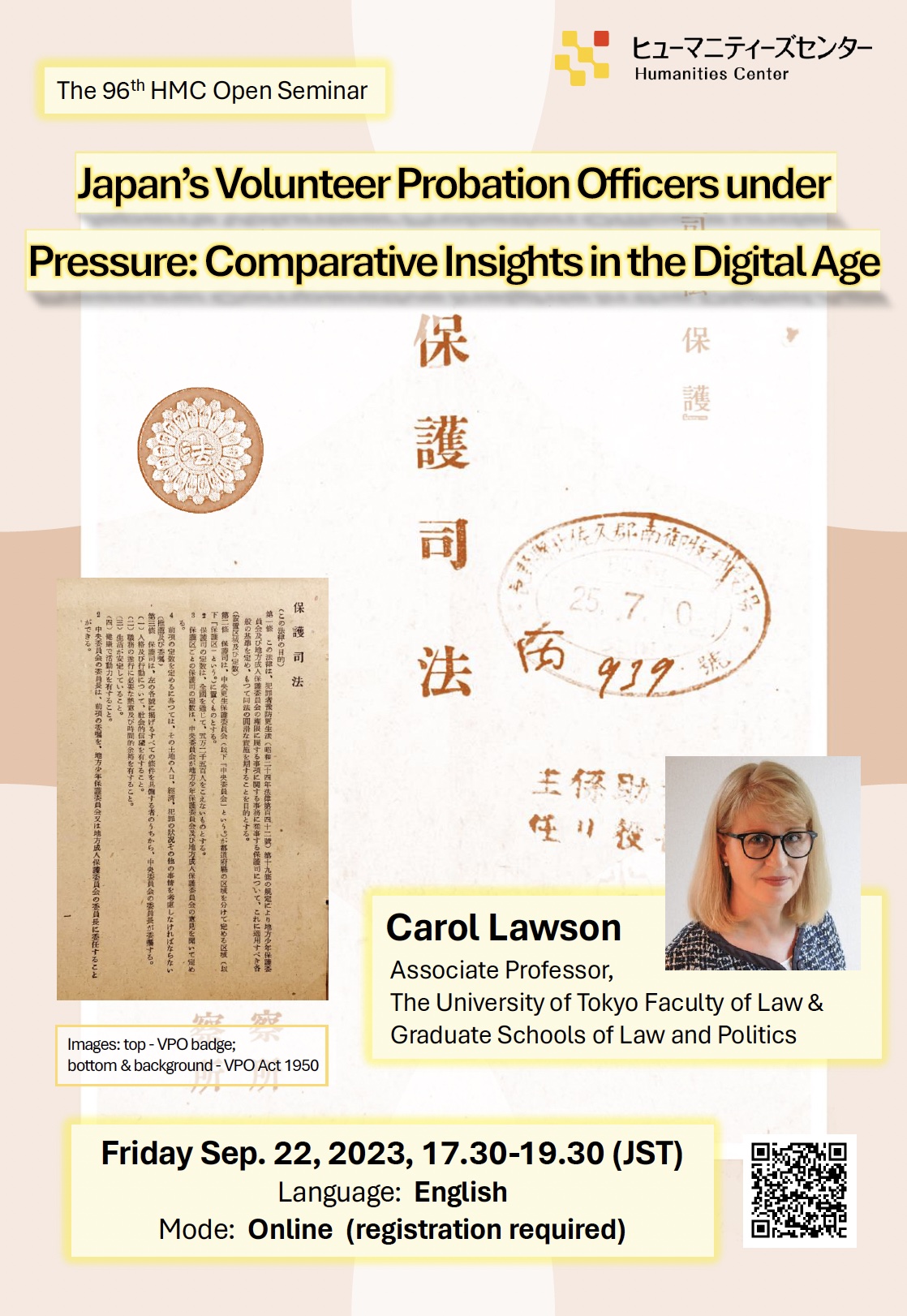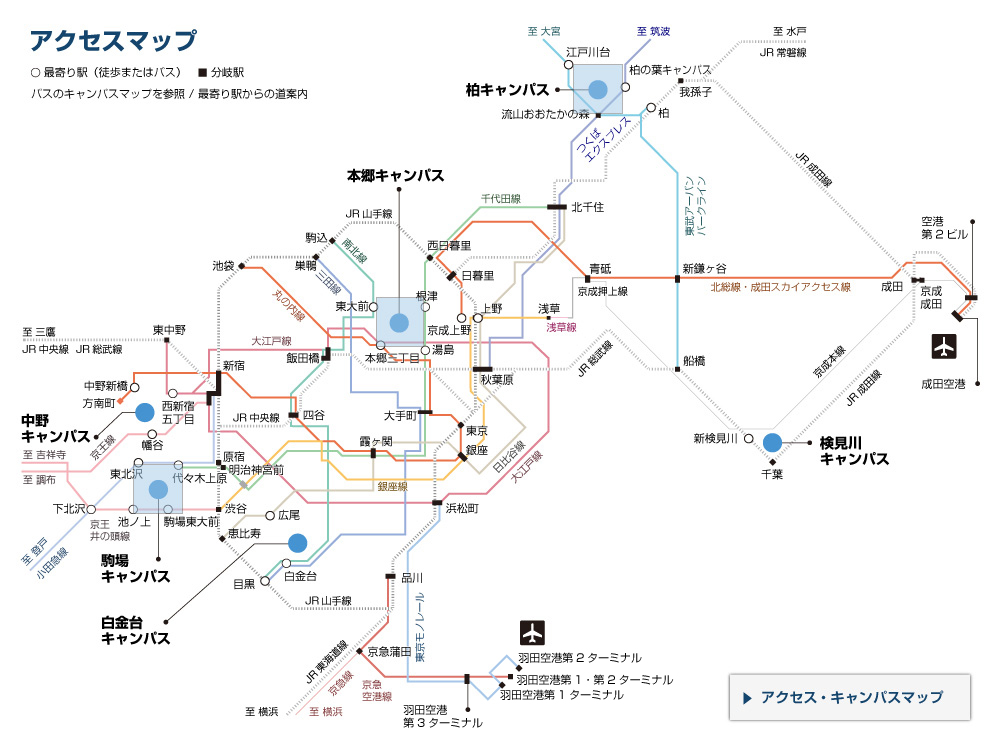セミナー「保護司たちの重圧:デジタル時代における国際比較の観点から」(英語開催)

基本情報
| 区分 | 講演会等 |
|---|---|
| 対象者 | 社会人・一般 / 在学生 / 受験生 / 留学生 / 卒業生 / 企業 / 高校生 / 大学生 / 教職員 |
| 開催日(開催期間) | 2023年9月22日 17時30分 — 19時30分 |
| 開催場所 | オンライン |
| 参加費 |
無料
|
| 申込方法 | 要事前申込
こちらのZoom登録ページよりお申し込みください。 https://u-tokyo-ac-jp.zoom.us/meeting/register/tZErdeyqpjkpGdBvGR-47RVw82KOo6m3UXNE |
| 申込受付期間 | 2023年9月11日 — 2023年9月22日 |
| お問い合わせ先 | 東京大学ヒューマニティーズセンター hmc-info*l.u-tokyo.ac.jp(*を@に置き換えてください) |
東京大学ヒューマニティーズセンター(HMC)は、定期的にHMCフェローの先生方によるオープンセミナーを開催しております。皆様のご参加をお待ちしております。
本セミナーは英語で開催されます。
| 報告者 | キャロル・ローソン(東京大学大学院法学政治学研究科准教授) |
| 主催 | 東京大学ヒューマニティーズセンター |
| 使用言語 | 英語 |
Abstract
Japan has achieved enviable success in decarceration over the last 15 years. The prison population at the end of June 2023 stood at under 40,835; just 50% of the peak of 81,255 seen at the end of 2006. For Japan, this disciplined return to its traditional parsimony in imprisonment marked the end of a disastrous decade-long experiment with penal punitivism. However, success in diverting more offenders to non-custodial measures like probation and parole brings its own complexities. The community corrections system must cater for a larger share of offenders, for longer - including those who are older or have complex needs.
This poses particular challenges in Japan, where the vast majority of probation and parole services have been delivered by a small army of up to 50,000 citizen volunteers, known as hogoshi (Volunteer Probation Officers) for 150 years. Respected members of local communities, hogoshi provide highly-responsive, personalized mentoring which reintegrates each probationer into a local community, under the watchful guidance of a much smaller cohort of 1,000 professional Probation Officers. These longstanding arrangements have facilitated a whole-of-government effort since 2012 to reduce recidivism rates. Embodied by the second Abe administration's slogan "Make Japan the Safest Country in the World," this comprehensive approach has seen two-year recidivism rates fall to as low as 15%.
The trouble is that over the last 5 years, it has become increasingly difficult to maintain the required numbers of hogoshi, with numbers falling annually. Demographic and social change means that this workforce, like many other Japanese workforces, is experiencing rapid aging and decline. This Japanese probation workforce crisis has emerged amidst global trends towards governments increasing their reliance on penal voluntary sector labor and digital technologies provided by private enterprise. Both these trends have attracted robust scholarly critiques but appear to be inexorable. They point towards overstretched governments shifting away from "welfare state" governance of community corrections - where the state not only decides on policy, but also resources and delivers the services that implement that policy itself - towards "regulatory state" governance. In "regulatory state" governance, the state still controls policy, but outsources resourcing and delivery to private actors, whom the state oversees.
Japan's community corrections system appears to have bucked both trends, making it a fascinating case study. It seems to be far ahead of the curve in terms of outsourcing and far behind the curve in terms of digitization. How might a jurisdiction that already has a history of not only using imprisonment as a last resort but also successfully outsourcing community corrections to volunteers, while resisting the siren call of digitization, navigate a significant decline in its ability to recruit the Volunteer Probation Officers who have made these achievements possible? What aspects of its almost wholly outsourced - and quintessentially analog - model might change without threatening the hogoshi system's laudable economy, personalised touch and communitarian values?
This presentation will report on insider perspectives that shed light on these questions. It will report on an empirical study, conducted in mid-2023, which sought the views of more than a dozen participants who are grappling with the day-to-day realities of Japan's dilemma: Probation Officers, Volunteer Probation Officers and probationers who participated in semi-structured interviews carried out in three probation districts in the Kanto region. Drawing insights from the growing English-language literature on the penal voluntary sector and the encroach of digital technologies in community corrections, it will consider the potential implications for both Japan and jurisdictions that seek to emulate its success in decarceration.






